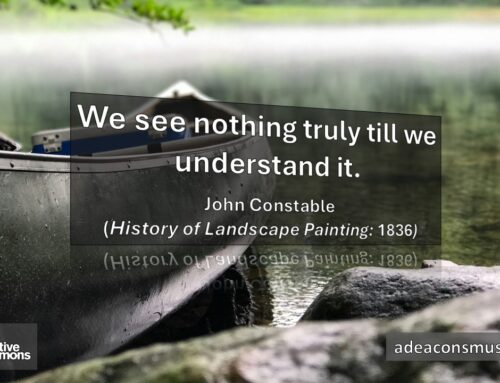The first blog that shared this title – Change – was written about four and half years ago. I wrote it is as I walked into my current role with the United Church of Canada. Since then, I’ve certainly mused a significant amount about change.
As I was reflecting on this body of work, I recognised two things:
- Most often I have spoken about change from an organisational context. This of course makes sense, since that is the vantage from which I have been writing in respect to my role with Winnipeg Presbytery; and,
- Often the personal reality, the lived experience, in respect to change can become lost, muted and even silenced. I would like, therefore, (for us) to talk a bit about both the personal and organisational experiences that occurs in change.
Change: Grief/Loss
One of my initial musings for this week's blog is that change, whether affirming or difficult, always carries with it grief or loss. I do not mean to imply that the experience of change – when considered simply as 'good' or 'bad' – has equivalency. Though there is loss, in respect to change, when there is a marriage or birth of child, they cannot obviously be paralleled in respect to an experience that brings trauma or violence. That having been said, it remains important to recognise that the milestones of the life cycle, even in the midst of joy, often possesses aspects of loss. Hopefully that which is gained or added more than compensates, but that is not always the case.
Change: Congregational
Another reflection, about which I have been musing, has been in respect to the initial context of the first Change blog: congregational. There can be change that is chosen and there is change that is precipitated by crisis. Chosen and precipitating are not either/or poles: rather they frame a continuum of both/and with varying degrees as to which is more prevalent. Regardless as to whether it is anticipated or difficult change, there will be a range of responses: despondent and hopeful, anger and joy, possibility and deficit, and disappointment and anticipation. All of these can exist at the same time.
Change: Crisis
Then there is change that occurs as crisis, whether individually or corporately. Most often crisis, as change does not begin with choice, per se. As the videos at the end of this musing illustrate, issues of violence and justice are often found to underlie change that is both culturally specific, as well as personally devastating. In this kind of change, how one (whether collectively or individually) responds can become a matter for reflection. Just as importantly, how those of us who may offer care and support, may well model the degree to which healing might occur. These choices, whether life-giving or soul-devouring, must acknowledge that there is no returning to what was. There is no cure, though there may be healing. What change – as an event connected to chaos – illustrates is the responsibility for care-givers to be present, to listen deeply and to be most vigilant to avoid the temptation to fix.
I do not mean to offer these three of change (Grief/Loss, Congregational, and Crisis) examples as an exhaustive list of possible experiences. I do think, however, that they offer a continuum of sorts. Furthermore, though the crisis example should never be presented as falsely equivalent to others, I do think that it offers a way to understand change from the Christian tradition. So, as our conversation moves towards a pause, let me try to make some connexions in respect to change from that vantage.
Crisis (the moment/experience that precipitates change) might be considered as the moment of the Cross. Whether that is an event, a choice, something about which we do or do not have control, the Cross is a symbolic (and literal) marker between what was and what might be. What might be, what the Christian tradition might call Resurrection, has not yet happened. It is this in-between space that the real work, the struggle, the discerning, the celebrating and the raging occurs. How we navigate this place demonstrates how well we care for one another – what Christians might understand as witnessing in the practice of practical theology. How we walk with one another is a matter of care that might be considered leadership or discipleship.
The Cross moment, as I have suggested, certainly has degrees of sensitivity and impact, if you will. Again, not to equate them, but whether a marriage or a violation, a change in an organisation or death, how we knit together 'newness' in these change places requires us to trust one another. Though marriage might seem "easier" or "simpler," from a purely abstract consideration, yet real life does not often operate in a linear manner, contrary to what we might hope or even try to manage.
A marriage may be the crisis that brings back memories or experiences that were, at one time, better avoided. A change in a congregation might remind us of forgotten or repressed experiences. For those who can walk with us in these places, how we respond becomes most significant. In this in-between time of what was and what might be, we can offer care, without assumption. Whether there are tears or laughter, perhaps even both, we can endeavour to listen, without an agenda. Such opportunities become practices of intimate care in the sacred moment of witnessing and sharing vulnerability.
If, in such places of change, we engage with one another with respect and care, there is the ever-present-possibility for transformation. It is one thing to be changed by a moment or event. It is another matter when people come together as a community of two or more. That which was will never be again – but the meaning that arises in the collective endeavour is the promise of newness, of transformation, that arises in caring relationships. That newness, ultimately, feels hopeful. Though it may not be an easy journey, it is one that I offer is faithful indeed.








I understand the tradition of the Cross being a suffering event. The Cross taxes the hearts and minds of the disciples and causes them to work for their salvation and causes others to remain in the dark and slaves to sin. The Cross is depicted as being a stumbling block to the Jews and foolishness to the Greeks and Gentiles (1 Corinthians 1:23). However, I think people have been misled to think of the Cross as an actual cursed TREE rather than a woman draped in scarlet that Simon the Cyrene lifts up as the True Vine (Psalm 128:3; John 15: Mark 15:21; Psalm 118:22; Acts 4 10-11) and the Rabboni calls Mary, for he knows all too well that the Almighty has dealt very bitterly with the Woman he meets “face to face” outside the tomb and her foremothers.
Thanks Linda for this reflection. The manner in which I have been using the Cross is not as a ‘suffering’ event. Rather the point when that “which was” changes. This can mean suffering may follow, or what sometimes is called “Holy Saturday.” In respect to “cursed tree,” though I know of that tradition, I more often see the cross as an image that is subversively used to indicate the path to transformation or newness, even in the midst of the reality of pain, loss or suffering.
So if we accept the Cross as a Symbol of change or commitment, would you say Holy Saturday would be a time when doubts, fears, and guilt concerning the past overwhelm those about to accept or reject the change?
I do not think that accept or reject resonate for me in respect to my experience of Holy Saturday. Perhaps the word integrate might fit? There is an intention implicit in the experience for the community to help foster “newness” or “resurrection.” Depending on the change, without collective care, trauma and ongoing hurt becomes a non-linear reality. Does that make sense? Too dense for text? Thanks for the engagement and great question Linda!
I’m sorry for taking so long to get back to you. I’m not sure you understood my use of the word accept. However, i will accept the word integrate and proceed to offer a further explanation of what I meant by accepting the Cross as a suffering event.
Integrating the Holy Spirit into our lives may foster “newness” or “resurrection. Integrating the Cross as a symbol of Divine Love may do so too. Tradition says Jesus accepted the Cross and suffered for us. Seeing with the head, one may see the Cross as a pole with a cross piece attached to it. Seeing with the eyes of the heart, I see the Cross as a human being who represents a woman who loves much. Integrating a woman who loves much into one’s life and into one’s community may cause one much joy and happiness. This integration of someone who loves much into one’s life will cause one’s old life to come to an end. Nothing will stay the same. Newness will come and one will “suffer” the loss of some things or old habits one has let go of to welcome, the one who loves much. More importantly, one will suffer every tear the woman who loves much sheds, because one who loves much empathizes with the “other” one loves. Does that make sense?
How great to hear from you Linda – thanks for your intention to continue the conversation. I found this very helpful in your reflection: “Tradition says Jesus accepted the Cross and suffered for us.”
I hear in this the power of choice in the path of discipleship. The choice to open ourselves to the Spirit makes space to experience our own and others suffering. In that space, joy and pain can dance with the promise of newness as we integrate such experience. Does that resonate with your offering?